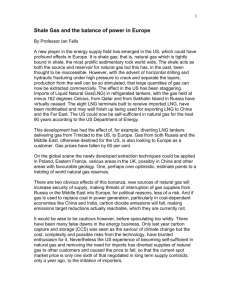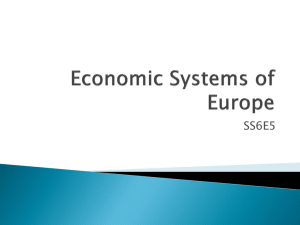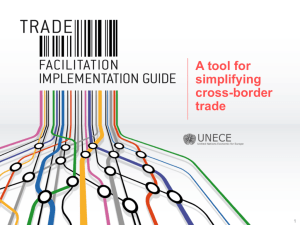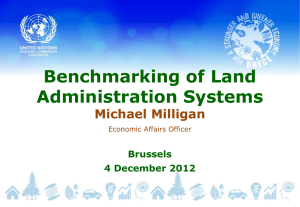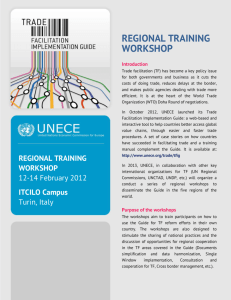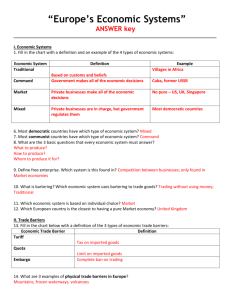Recent developments in natural gas market Ms. Valérie DUCROT
advertisement
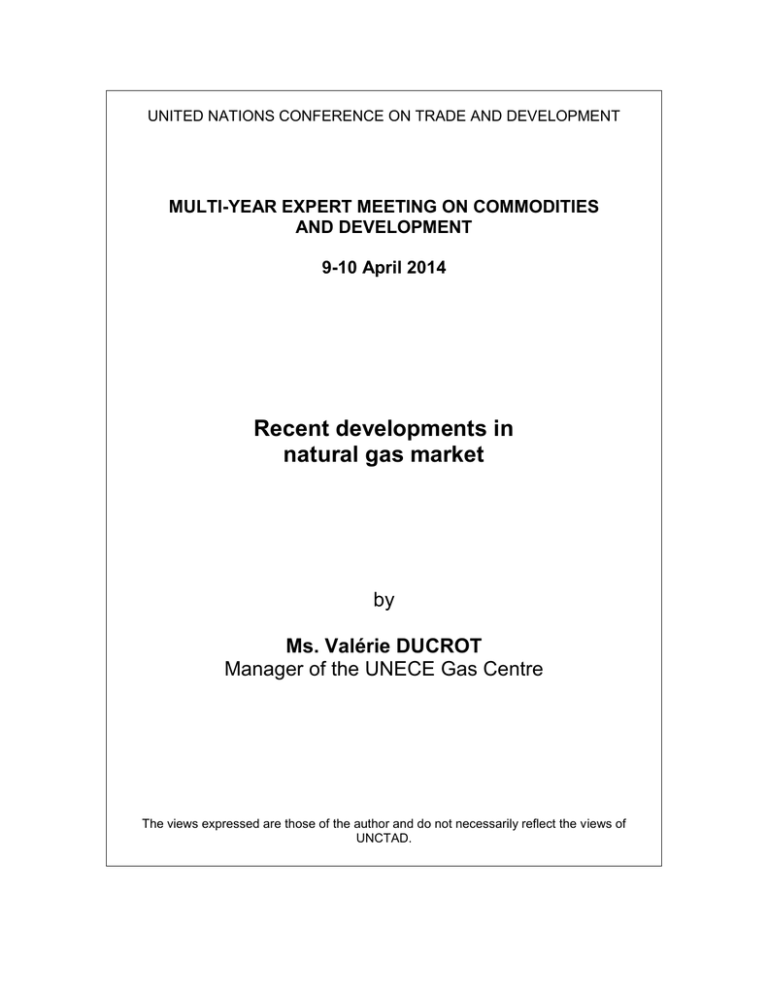
UNITED NATIONS CONFERENCE ON TRADE AND DEVELOPMENT MULTI-YEAR EXPERT MEETING ON COMMODITIES AND DEVELOPMENT 9-10 April 2014 Recent developments in natural gas market by Ms. Valérie DUCROT Manager of the UNECE Gas Centre The views expressed are those of the author and do not necessarily reflect the views of UNCTAD. Recent developments in natural gas market Valérie DUCROT Manager of the UNECE Gas Centre Geneva 9 April 2014 About Gas Centre A Gas Centre dedicated to economies in transition The UNECE Gas Centre was launched in 1994 as a technical cooperation programme. “Promotion and Development of a Market-Based Gas Industry in Economies in Transition the Gas Centre”. It was established to assist governments and gas companies in Central and Eastern Europe in their efforts to create more decentralized and market-based gas industries. Today, in addition to contributing to institutional capacity development and training for the benefit of economies in transition, the Gas Centre activities are focussed on: • Exchange of information and data between the member companies on the gas markets and gas industry and especially between member companies with experience in free-market conditions and companies in countries with an economy in transition; • Exchange of information and views between the gas industry, the ECE and government on policy issues; • Serving as a platform for discussions on topics of interest and policy development. About Gas Centre The programme is extra-budgetary and financed by some 20 major gas companies, stateowned and private, from Europe, the United States and the Mediterranean Basin, namely: AFRIQUIA GAZ (Morocco) – BOTAS Petroleum Pipeline Corporation (Turkey) – EDF (France) – EDISON (Italy) – Egyptian Natural Gas Holding Company (EGAS) (Egypt) – Eni Gas and Power (Italy) – GAIL (India) – GasNatural Fenosa (Spain) – GAZNAT (Switzerland) – GAZPROM (Russia) – GDF Suez (France) – KazMunaiGaz (Kazakhstan) – MOL/FGSZ Ltd (Hungary) – NJSC NAFTOGAZ/UKRTRANSGAS AC (Ukraine) – OMV Gas & Power GmbH (Austria) – PLINACRO (Croatia) – ROMGAZ (Romania) – PLINOVODI (Slovenia) – SOCAR (Azerbaijan) – SRBIJAGAS (Serbia) – STEG (Tunisia) – SWISSGAS (Switzerland) Natural gas: global market under construction Gas is available – and widely distributed Shale gas leads growth of production in the USA Natural gas and LNG exports from the USA Emerging economies, mainly Asia, drive the energy demand Growth in primary energy demand – by region Global energy demand increases by one-third from 2010 to 2035, with China & India accounting for 50% of the growth. Source: IEA Natural gas demand growth comes mainly from Asia World Natural Gas Prices Cost of export from US to Asia / Europe: Henry hub plus 5-6 USD/mmbtu Natural gas partnering with renewables Society needs energy 24 hours / 7 days Natural gas easy to turn on and off Natural gas for transportation (CNG / LNG) Economics and environment – the main drivers Gas – fueling more of the world! Global gas markets • North Amercia – the shale gas revolution - Boosting economy and reducing CO2 emissions • Europe – gas squeezed - Renewables subsidies and low coal prices • Asia and South America - Gas pricing a key issue • Middle East / Africa – domestic use and export Huge regional variations! Diversification of supply routes and suppliers China’s diversified gas supply sources Policy and regulation to encourage investments • Investments in gas infrastructure - International partnership, risk sharing, long term contracts • Market-oriented prices and tariffs • Facilitate transfer of technology • Financing and tax regime Enable business to do business! Supply post‐Fukushima • - Around 12.5 million tonnes in 2011 from the Atlantic Basin Cargoes diverted from West Africa and Europe • Europe – increased pipeline supplies (Russia, Norway) • LNG demand increase 15 mill tonnes in 2012 (20 bill cm) • Qatar, Russia, Malaysia and Indonesia arranged swaps and diverted cargoes. Successful response by gas industry Main Reasons for the importance of NG in Europe - Contribution to the reduction of CO2 emission - Better adaptability to the intermittency of electricity production - Increase the Security of Supply due the new Gas Corridor • • • • 58% Norwegian 27% Russia 7% pipes from North Africa 8% LNG Reduction of CO2 Emissions Natural Gas emits: •57% less CO2 than oil •43% less CO2 than coal For the same amount of electricity produced. Contact Gas Centre Ms. Valérie Ducrot Manager Tel: +41 (0)22 917 2474 Fax : +41 (0)22 917 0430 E-mail : valerie.ducrot@unece.org www.gascentre.unece.org Thank you
